How To Get Rejected By YC And Move On: A Proven Framework
You don’t know me very well, but if you get me started I have a tendency to go on and on about how hard the writing is for me. But this, this is the hardest thing I ever had to write. (Hank Moody)
The past two weeks, for me, were dark – like tornado-devastatingly dark.
And since there’s about ~5 DAP (daily active people) in my life – all of whom are pretty much professional connections – I had no one to even vent to about what was going on.
See, my life feels like a constant battle – a war between who I used to be and who I’m striving to be. A war between my personal life and my professional life. A war between reaching for what I want and minimizing what I need. A war between people who “get me” and people who love(d) me.
Feelin’ so distant from everyone I’ve known
To make everybody happy I think I would need a clone
Key Takeaways
- Embrace rejection as a learning opportunity; use feedback from Y Combinator to refine your business model and approach.
- Persistence is key; multiple applications to Y Combinator are common, and rejection should not deter future attempts.
- Diversify your efforts by considering other accelerators like Techstars and 500 Startups which might align with your startup’s goals and needs.
- Continue to enhance your product and business strategy based on industry feedback and market needs, irrespective of Y Combinator’s initial rejection.
- Keep your passion alive: let your love for your work drive you, and remember that every setback is a setup for a greater comeback.
Hit Rewind

And that’s where I screwed up.
Before Oct. 28, I was convinced that my startup would, at the very least, get an interview with Y Combinator – the Harvard of accelerators.
Oct. 19 – Oct. 22
When my advisor tried to get me out of this narrow-minded mindset, I brushed him off, listing off all the reasons YC just couldn’t possibly overlook us.


I had done everything creatively possible to make YC notice us. I reached (or thought I reached) just about every single partner through every single avenue I could think of.
First, I experimented with ads on LinkedIn and Facebook. The ads sent the people who clicked, to, what I thought, was a moving landing page.
Then, to cast a wider net, I repurposed my copy on Medium.
Next, I emailed people, asking for help, and wow, 95% of everyone I emailed came through for me. (Thank you) <3
A few YC alums offered to “recommend” my application – something I had no idea went on behind the scenes. If I had that little nugget of insider information – that YC alums recommend applications through some type of backend system – my strategy would’ve shifted dramatically. I didn’t though, and so that definitely hurt me a little.
In addition to the handful of YC alumni recommends, I got a warm intro from a connection, who seems to believe in me for some reason, to a YC partner.
His warm intro curdled into ice-cold silence. So I followed up with another email to the partner I’d been introduced to.
This was his response:

Complete mindf*ck.
This partner knew I was an applicant and had agreed to connect to me so why was this his response? I didn’t get it.
Oh, and did I mention, the week prior I went to the mall to look for a perfectly creative and moving card for this same YC partner because who doesn’t love to get a handwritten letter every once in a blue moon?
I know he got it because I invested $19.99 in overnight shipping and package tracking. He didn’t acknowledge it.
I still wasn’t phased though. I always love an exceptional challenge – that is until it kills me.

So, in the meantime, I decided I couldn’t just rest on my laurels and I tried to participate in Sam Altman’s HN AMA, but he ignored my question.

My “Impostor Syndrome” promptly took over. I had convinced myself that Altman definitely thought my question was stupid and therefore he totally wrote me off as an idiot.
Any logical person might’ve thrown in the towel at this point, but I’m not very good at being logical, which I compensate for by surrounding myself with brilliant and very logical mentors/friends.

So yeah, a day or two later, I attended a Product Hunt Live AMA with two YC partners.
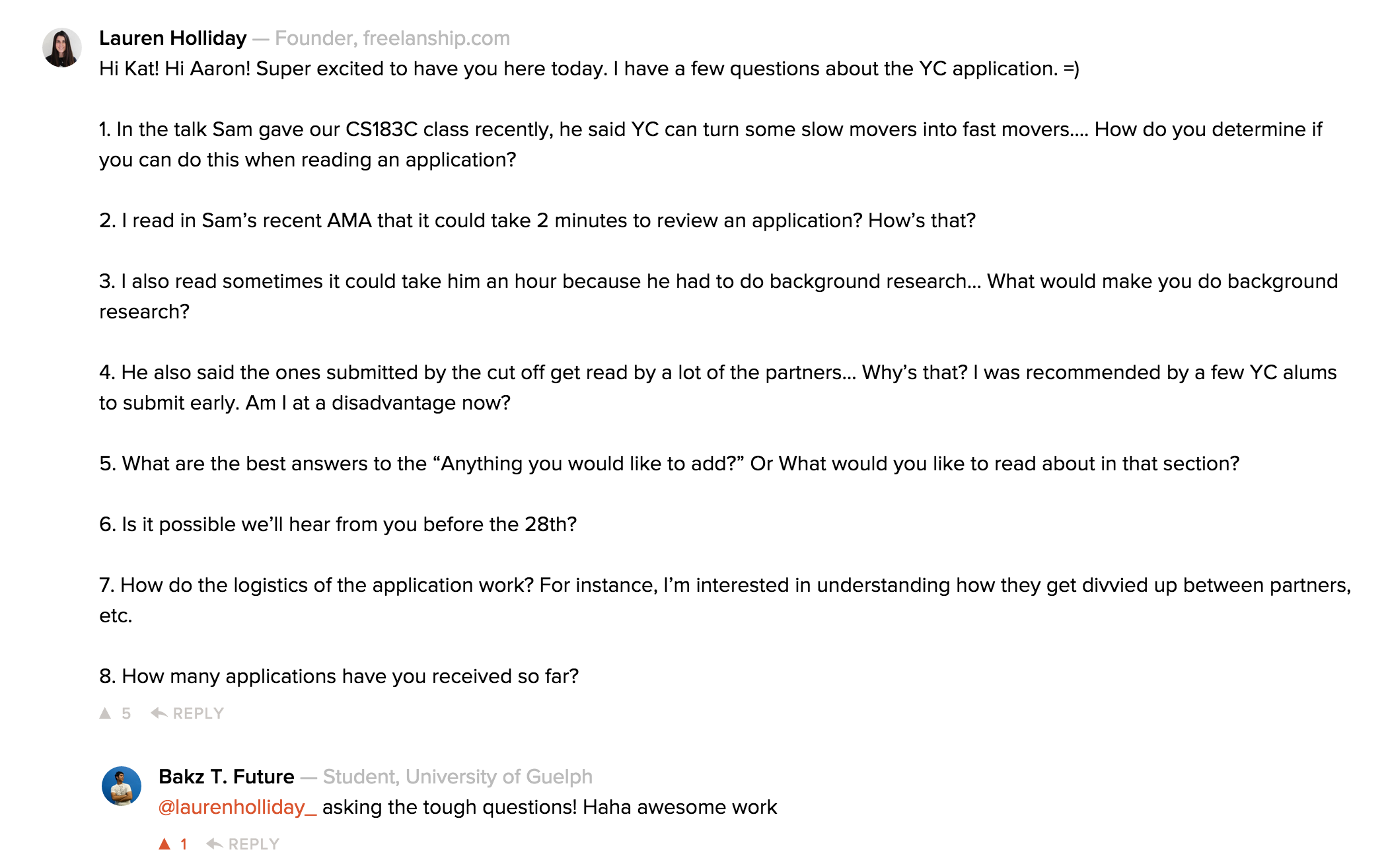
This time, I got a response. Here it is:
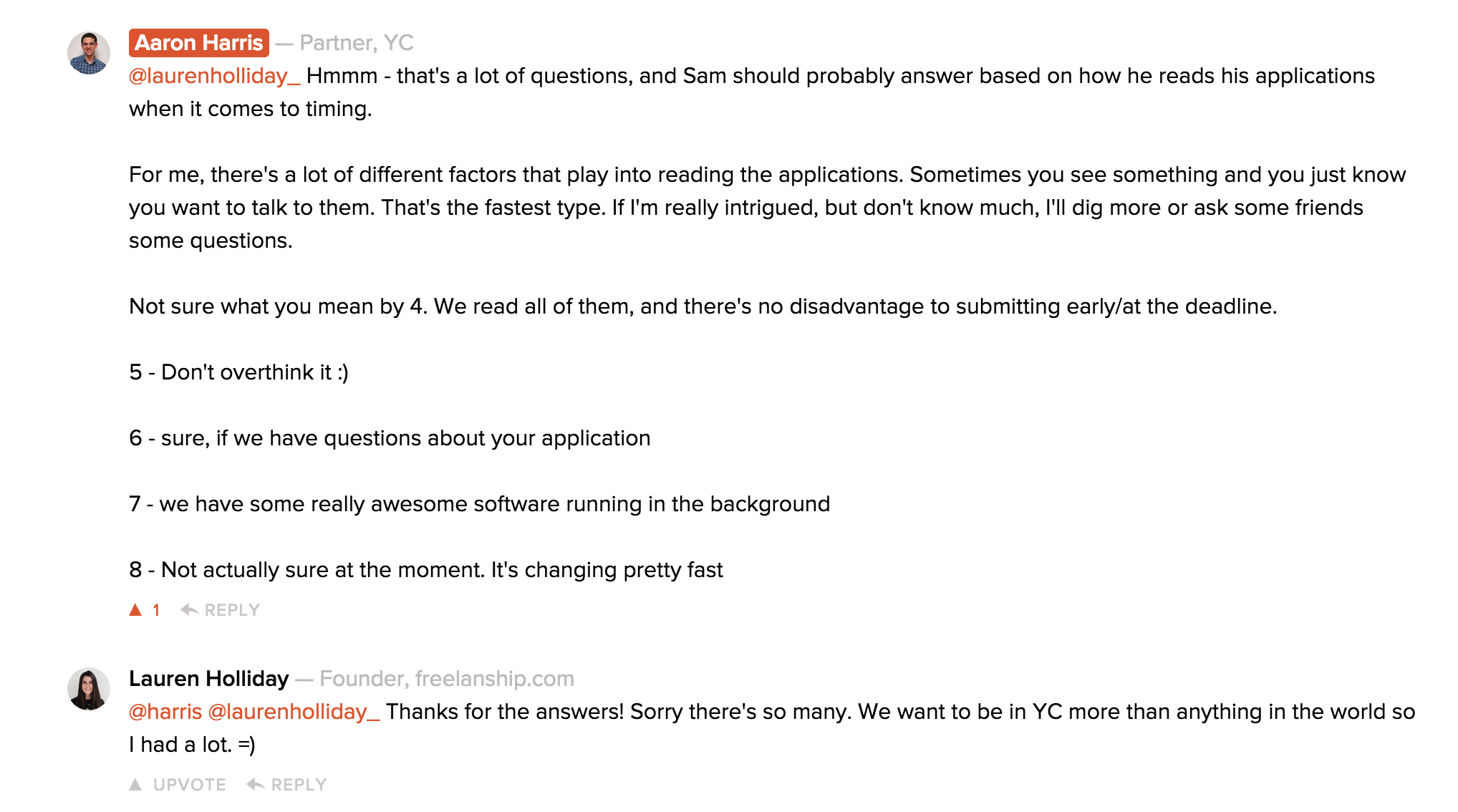
I was a little disappointed by Harris’ shallow reply, but I told myself that was wrong and selfish of me. I mean I had asked him a boatload of questions, and he did have to answer other attendees’ questions – not just mine.
Plus he’s a YC Partner so he’s really important and busy – way more important and busier than me – right?!

So by now, I was starting to get a little worried.
They clearly didn’t like me – or even worse – didn’t even notice me. It was time to experiment with a different tactic, I thought to myself.
And so like any illogical and obsessive love-sick girl, I purchased a course on financial models (which was phenomenal by the way).
A couple hours and two email chains later (one between me and a VC and another with a friend, who is a CPA) , I had – what I believed – was a beautiful user acquisition spreadsheet.

I invested my own resources and stole other important people’s time creating this spreadsheet because I knew that Sam Altman respected unit economics and resourceful and scrappy founders, who don’t squander the money they raise.
See I studied journalism in college, and I thoroughly enjoy researching, therefore, I had done my due diligence. Not only had I conducted interviews with people who actually knew Sam, but I had also gathered and organized an exceptional amount of information on YC – like even the stuff on Google Page 4.
I’m so embarrassed for myself. It’s really embarrassing how delusional I was just a week or so ago.
There’s absolutely zero way I know what or who Altman values and respects because I only know what Altman – the president of the most elite accelerator program in the US – chooses to tell me and millions of others in YouTube videos and blog articles.
I am so disgusted with myself for being so senile.

Everyday I live behind-the-scenes of the Internet, as someone who writes for it on the reg and as someone who is friends with a good deal of influencers, who write for the Internet too. Therefore, I know that there is always – literally always – information we leave out in order to protect ourselves and our vulnerability.
And this, my Internet friends, is what’s freakin’ wrong with the Internet. I want you to understand this and realize you are never getting the entire story because no one is willing burn for you. No one wants to tell you the stuff that might possibly make you judge them. No one – no matter how powerful – wants to be judged.
Anyway, so back to the story. I sent this email (with my killer spreadsheet attached) to Altman and 2 other partners, as I had been advised to do by a YC alum.

And he responded. Sam freakin’ Altman responded. This was what he said.
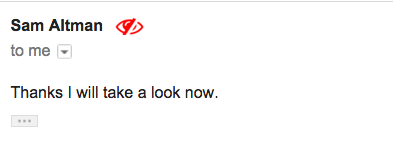
Finally, Altman knew who I was, and I smirked to my-sick-self.
Remember, I was delusional at this particular moment in time, and so, I thought I was totally winning.
Oct. 23

Then a few days later, I got an email from YC that said I had an interview – except it wasn’t an actual interview – it was just something YC calls “Office Hours.”
Unfortunately, I realized this only after it was too late. After I had already bought my plane ticket, with someone else’s money mind you, because I had no money to spare for the trip myself.
I told this person, who loaned me the money, that YC reimbursed interviewees for traveling costs, as I had read they do.
But remember, I didn’t get an interview – I got this thing called “Office Hours.” And like anyone, I made myself miserable over this “sunk cost.”
Smart people will tell you to let your sunk costs go, i.e. you shouldn’t keep allocating resources into something that has little to no chance of survival. But this is really difficult for normal people, like myself, to do – let go of something (or someone) you’ve invested a lot of resources in.
Oct. 27

And so I did the opposite of what smart people would advise me to do, and at 3:30 a.m. EST I woke up; made my way to the airport; and arrived in Vegas around 10 a.m. PDT.
I worked until 2:20 p.m. PDT rolled around, and then made my way to my non-interview, which lasted about ~20 minutes.
The conversation added zero-value to my life. He gave me tons of advice that I’ve heard a ton of times before (and have neatly organized in G-Drive).
This Lil Wayne lyric comes to mind when I think of the meeting:
Cause to her I’m just a rapper, and soon she’ll have met another
To him, I’m just a founder, and soon he’ll have met another. And he did meet another, literally before I even got up from the table we were sitting at.
After this ~20 minutes of hell, I walked in circles around The Venetian. I was at a loss of what to do, and finally, I gave up and invested in a few much-needed beers and shallow conversation with a cute bartender.
Oct. 28

After sedating myself with a couple beers, I grabbed a cab and booked it to the airport to make my 11:50 p.m. PDT flight home to Boston, where I arrived around 10:30 a.m. EST.
Finally, I took a nap. Then I woke up to the email from hell.
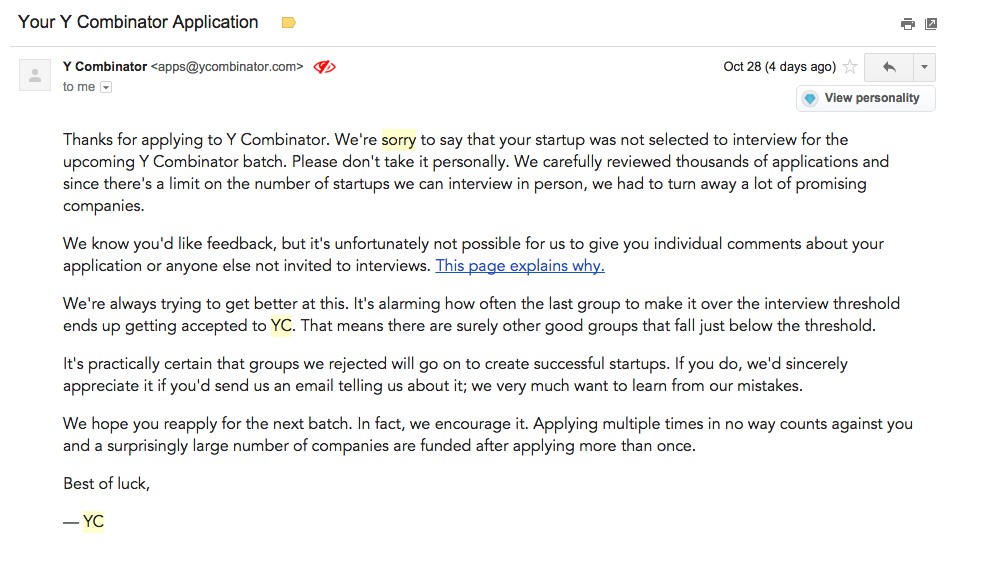
And then I received the text message from hell aka my mom.
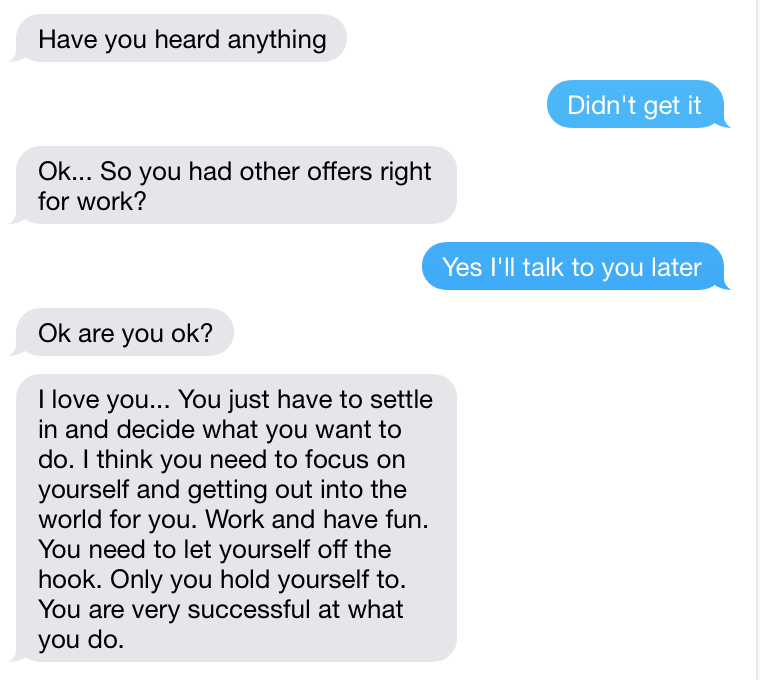
My mom loves me a lot, but she doesn’t get me or the life I’ve chosen for myself.
She doesn’t understand why I work so hard, when 90% of the time I don’t get what I want, or see any ROI from the exuberant amount of time I spend working and helping other people without asking for anything in return.
She wants me to be happy, and so, she wants me to spend more time doing things for myself and less things for other people, who I don’t even know or who don’t even notice or value everything I have to offer.
This is an example of the battle – the war – I was describing earlier.

Side 1: Personal
My mom has told me a million times that she hates Freelanship (my startup).
She doesn’t say this because she doesn’t love me, but because she sees how lonely and sad I am a lot of the time, and she wants me to just focus on making a living and creating stability for myself.
Hence her subtle words:
“You need to let yourself off the hook. Only you hold yourself to.”
It’s so ridiculously depleting and difficult to keep trying to convince the ones you love that what you’re doing is so insanely important for the world that you are willing to burst into flames in order to solve this gigantic problem that contributes to making millions and millions of less fortunate people’s lives better.
I look pretty stupid (and lame) to those in my personal life who don’t understand why I don’t enjoy myself more often.
So I can’t cry to them about losing something like a YC-interview because to them it’s another reason to give up, and they will assure me that it is totally 100% okay to give up and let someone else solve this massive crisis young people are in right now.
Side 2: Professional
Then there’s my professional life – the people who rarely, if ever – see how depleted I am because I am so energetic and excited all the time, which I’m not really faking because I do love the hell out of what I do for work.
So, while these people “get me,” they don’t love me because they aren’t, say my mom or my boyfriend; and so, they aren’t people I can confide in or vent to because that’s just unprofessional and weird.
Not to mention, it’s really not cool to whine about “challenges.” It is only really cool to write about them after you’ve overcome them though.
So who can I look to for solace?
Definitely not from anyone in my personal life.
I would chew off my left arm before I told my mom about the email replies I got from the people I emailed at YC, who I had connected with before, as soon as I received their automated rejection letter.
The response from Altman was probably the most devastating and insulting and horribly depressing of them all.
(Weirdly, I can’t find the email to screenshot for you, but I can see it very clearly in my head so I’ll type the gist of it.)
Hey – I was getting too many unsolicited emails at this address so I no longer use this account. If you need something email SArouter@ycombinator.com.
I almost died when I got that reply. It was like he’d drenched me – my completely open wound – with a sandbag of salt. It stung so freakin’ bad, and I felt helpless and weak from not being able to control this uncomfortable wave of emotions.

Nov. 2
I’ve moved on.
Yet again, I’ve survived another heart-wrenching disappointment by myself, and I’ve grown stronger and smarter because of it.
As Steve Jobs once said:
I had been rejected, but I was still in love…
…You’ve got to find what you love. And that is as true for your work as it is for your lovers. Your work is going to fill a large part of your life, and the only way to be truly satisfied is to do what you believe is great work. And the only way to do great work is to love what you do. If you haven’t found it yet, keep looking. Don’t settle. As with all matters of the heart, you’ll know when you find it. And, like any great relationship, it just gets better and better as the years roll on. So keep looking until you find it. Don’t settle.
I’m lucky, I’ve found what I love to do early in life, and now, I want to do everything and anything I can to help my peers do the same because doing what you love – I swear to God – is not always this shitty. It’s actually kind of really fulfilling.

With that being said, it’s also wildly difficult to essentially “make it;” therefore, you need at least 1 person in your life who “gets” you and loves you.

This is why I struggle more than I need to all the time – because I don’t have even one person in my life who “gets” me and loves me.
That was one of the many reasons I really wanted to be in YC. I thought being a part of YC would be the answer to my struggle because they do dinners and teams live each other and there’s always someone around who can relate to how bad shit sucks at a particular moment in time.
As you know this wasn’t the answer.
I didn’t write this post so you’d throw me a pity party though.
I wrote this post to stand up for what I believe in, and what I believe in is transparency, even if it transparency makes me look terrible, because I want every single one of you, who reads this post and who’s going through “The Struggle” alone, to keep fighting for what you love and what you believe in.

Conclusion

I am begging you to please learn from my mistakes and not suffer through them yourself.
My entire life has centered around trying to fit in with the “cool kids.” And I’ve got to tell you, I’m completely over trying to force people who don’t “get” me or love me to accept me.
I will not be re-applying to YC.
They’re just not the renegades I thought they were.
I will, however, be busting my ass to make them regret every email and Tweet and question they ignored from me one day.
For those of you who’ve read this much, I hope you don’t think I’m a loser now, but even if you do, I will survive because I know that I will do whatever – absolutely whatever – anything it takes to solve the problem I’ve committed myself to rectifying.

I hope you do the very same thing for yourself. I know you can so just do it.
Frequently Asked Questions (FAQs) about Y Combinator Rejection and Moving On
What are some common reasons for rejection from Y Combinator?
There are several reasons why startups get rejected from Y Combinator. Some of the most common reasons include a lack of a clear business model, a product that doesn’t meet market needs, or a team that lacks the necessary skills or experience. Additionally, Y Combinator is highly competitive, and they can only accept a limited number of startups each cycle. Therefore, even promising startups may face rejection due to the sheer volume of applications.
How can I improve my chances of getting accepted into Y Combinator?
To improve your chances of getting accepted into Y Combinator, it’s crucial to have a clear and compelling business plan, a product that meets a market need, and a strong, dedicated team. It’s also beneficial to have some traction or proof of concept to show that your startup has potential. Additionally, practicing your pitch and thoroughly researching Y Combinator’s application process can also increase your chances of success.
How should I respond to a rejection from Y Combinator?
Rejection can be disappointing, but it’s important to remember that it’s not the end of the road for your startup. Use the feedback provided by Y Combinator to improve your business plan, product, or team. Consider applying again in the future, as many successful startups were accepted after multiple attempts.
What should I do after getting rejected from Y Combinator?
After getting rejected from Y Combinator, it’s important to reassess your startup’s strategy and make necessary improvements. Look for other funding opportunities, such as other accelerators, angel investors, or venture capital firms. Continue to build your product and gain traction in your market.
Can I reapply to Y Combinator after being rejected?
Yes, you can reapply to Y Combinator after being rejected. Many successful startups were accepted after multiple attempts. Use the feedback provided by Y Combinator to improve your application and increase your chances of success in the future.
How competitive is the application process for Y Combinator?
The application process for Y Combinator is highly competitive. They receive thousands of applications each cycle and can only accept a limited number of startups. Therefore, it’s crucial to have a strong application to stand out from the competition.
What kind of startups does Y Combinator look for?
Y Combinator looks for startups with a clear and compelling business plan, a product that meets a market need, and a strong, dedicated team. They also value startups that have some traction or proof of concept.
How can I use the feedback from Y Combinator to improve my startup?
The feedback from Y Combinator can provide valuable insights into the strengths and weaknesses of your startup. Use this feedback to make necessary improvements to your business plan, product, or team. This can increase your chances of success in the future, whether you reapply to Y Combinator or seek funding from other sources.
Are there other accelerators I should consider if I get rejected from Y Combinator?
Yes, there are many other accelerators that can provide valuable resources and support for startups. Some notable ones include Techstars, 500 Startups, and AngelPad. Research each accelerator to find the one that best fits your startup’s needs and goals.
How can I stay motivated after a rejection from Y Combinator?
Staying motivated after a rejection can be challenging, but remember that many successful startups faced rejection before they found success. Use the rejection as a learning experience and an opportunity to improve. Stay focused on your startup’s vision and continue to work hard to achieve your goals.
Lauren Holliday is a full-stack marketer.





